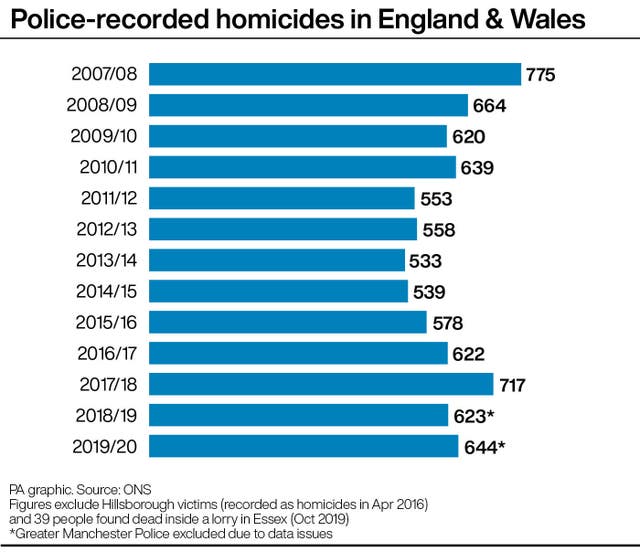The number of knife crimes in England and Wales has risen 6% to a new record high, official figures show.
Police-recorded offences involving a knife or sharp instrument rose to 46,265 for the year to March, up from 43,706 in the previous 12 months, according to information released by the Office for National Statistics (ONS) on Friday.
This was 51% higher than when data of this kind was first collected in 2010/11 (30,620) and is the highest number on record, the report said.

The report said: “Knife or sharp instrument offences continue to be concentrated in metropolitan areas across England and Wales, with around a third (34%) of all offences recorded by the police in London.”
The highest rate was also seen in London, with 179 offences per 100,000 population.
This compared with an England and Wales average of 82 offences per 100,000 population.
According to the latest statistics, assault with injury and assault with intent to cause serious harm offences, and robbery, each accounted for 44% of all offences involving a knife or sharp instrument (20,333 and 20,159 respectively).
Our latest crime figures relate to the year ending March 2020 – covering the period mainly prior to the #COVID19 lockdown https://t.co/gVwtwxTFmF
— Office for National Statistics (ONS) (@ONS) July 17, 2020
The ONS report added: “Offences involving knives or sharp instruments have been experiencing a rising trend since the year ending March 2014, although in recent years the rate of increase has slowed.”
Police recorded 5.8 million crimes in England and Wales to March, a 3% rise, the ONS said.
The news comes as separate figures from the Home Office show the proportion of crime suspects taken to court has fallen to another record low.

The total includes the bodies of the 39 Vietnamese people found in a lorry in Grays, Essex, in October. Excluding this, the number would have risen by 3%.
The figures also show a 23% rise of homicides recorded by the Metropolitan Police in the latest year – to 142 from 115.
But the report said the rate of homicide in the population remains “very low” at 12 per one million people.
Of all recorded homicides in the 12 months to March, 39% involved a knife or sharp instrument, slightly less than the previous period, according to the data.
Sophie Sanders of our Centre for Crime and Justice said:
1/3https://t.co/tKd03MWNTR pic.twitter.com/huRpYxK2Lx
— Office for National Statistics (ONS) (@ONS) July 17, 2020
While the proportion decreased, the number of homicides where a knife or sharp instrument was involved increased by 2% from 250 to 256 offences.
In London, this rose from 67 to 86, an increase of 28%.
Robbery rose for a fifth consecutive year, by 6% to 83,241.
But theft dropped 12% to 3,299,000 incidents and burglary was down 9% to 356,017.
The figures do not include Greater Manchester Police, who are unable to provide data due to ongoing problems with a new computer system.
She also said:
3/3https://t.co/tKd03MWNTR pic.twitter.com/5VB3wkNiNA
— Office for National Statistics (ONS) (@ONS) July 17, 2020
Last year, Prime Minister Boris Johnson announced that he would lead a new Cabinet committee looking at ways to tackle crime.
He also told ministers that every department should consider itself a criminal justice department as part of a drive to look at the “complex causes of crime” which would involve long-term reforms to improve health, social care, youth services and education.
Diana Fawcett, chief executive of the charity Victim Support, said: “It is concerning that, as the country began to enter lockdown, knife crime reached record levels,” and she added that throughout lockdown the impact of the problem “will have continued to be felt”.
Commons Home Affairs Committee chairman Yvette Cooper said the “continued, serious rise in knife crime is very disturbing”, adding: “The Government has promised a comprehensive strategy on prevention and policing but the prevention work in particular is extremely patchy and much more needs to be done in communities across the country to match the scale of the problem.”
John Apter, the national chairman of the Police Federation of England and Wales, said: “While it is heartening to see statistics confirming some crimes are down, I have serious concerns about the rise in homicide, knife crime, and robbery.
“It is a tragedy these crimes continue to spiral as my colleagues are stretched to their limits, but with fewer officers available to be out on patrol, it comes as no surprise.”
The statistics are “largely unaffected” by the coronavirus pandemic as they mainly cover the period before lockdown, the ONS said.






